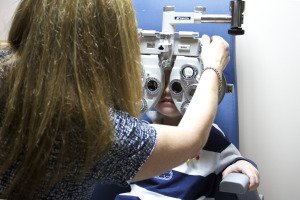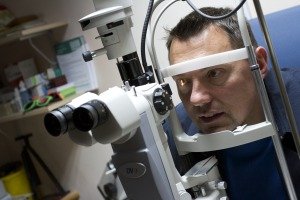Eye Examination
When and why should I have an eye examination?
 An eye examination isn’t just a quick check to see what you can see and provide spectacles or contact lenses to improve your sight. Here at CATS, an examination is a thorough comprehensive examination that not only checks your vision and prescribes spectacles or contact lenses when required but checks your eye health, which in turn can tell you about your general health such as diabetes,blood pressure and many other conditions. We also check how your eyes work together, your colour vision if required, and monitor your peripheral vision. It is essential to have regular eye examinations so that we may detect and treat when necessary or refer for treatment promptly any eye conditions you may develop to prevent any sight loss occurring. These include cataracts, age related macular degeneration, Glaucoma, diabetic retinopathy and many other eye conditions.
An eye examination isn’t just a quick check to see what you can see and provide spectacles or contact lenses to improve your sight. Here at CATS, an examination is a thorough comprehensive examination that not only checks your vision and prescribes spectacles or contact lenses when required but checks your eye health, which in turn can tell you about your general health such as diabetes,blood pressure and many other conditions. We also check how your eyes work together, your colour vision if required, and monitor your peripheral vision. It is essential to have regular eye examinations so that we may detect and treat when necessary or refer for treatment promptly any eye conditions you may develop to prevent any sight loss occurring. These include cataracts, age related macular degeneration, Glaucoma, diabetic retinopathy and many other eye conditions.
 You should have your eyes checked at least every 2 years – your optometrist may recommend an earlier interval if necessary. If you are experiencing any loss of vision or a deterioration in your vision, headaches, any disturbance in your sight, such as flashing lights or floaters or have any concerns about your eye health then it is advisable to call today to make an appointment for an eye examination. Our staff will provide advice as to how urgent an appointment you require and book an appointment accordingly.
You should have your eyes checked at least every 2 years – your optometrist may recommend an earlier interval if necessary. If you are experiencing any loss of vision or a deterioration in your vision, headaches, any disturbance in your sight, such as flashing lights or floaters or have any concerns about your eye health then it is advisable to call today to make an appointment for an eye examination. Our staff will provide advice as to how urgent an appointment you require and book an appointment accordingly.
What does the eye examination include?
Your eye examination will include some or all of the following …
History and Symptoms
- At the start of the eye examination, your optometrist will ask why you are having your eyes examined, whether it is a routine check-up or if you have come for a specific reason.
- If you are experiencing problems with your eyes or vision your optometrist will need to know what symptoms you have, how long you have had them and whether any changes have happened suddenly or slowly over a period of time.
- Your optometrist will also need to know about your general health including any medication you are taking, whether you suffer from headaches, or have any close relatives with a history of eye problems.
- You will be asked about your previous glasses or contact lenses.
- In addition, your optometrist may ask about the kind of work you do and whether you play sports or have any hobbies.
Examining your eyes
- Your eyes will be examined both outside and inside. This will allow the optometrist to assess the health of your eyes and may identify any other underlying medical problems.
- The interior of your eye will be examined using an ophthalmoscope, a special torch which shines a light through the pupil allowing a detailed study of the internal structures. Your pupil reflexes will also be tested.
- We also offer digital imaging of the inside of your eyes, your retinas, and outside of your eyes to monitor eye health and to detect eye disease.
Vision
- Remember to bring your glasses or contact lenses with you when you attend an eye examination. Your vision will be measured both with and without glasses or lenses to check for any problems with your eyesight. The optometrist will assess your distance vision (for TV and driving), your near vision (for reading and close work) and your intermediate vision (for computer use).
- Your optometrist will then carry out a series of tests to measure the type and extent of any problem with your vision. You will then be asked to choose between different lenses to see which ones help the quality and clarity of your sight. Many people become anxious about answering the questions wrong, such as “is this better or worse?” but there is no need as the optometrist does not rely totally on your answer – there is often no right or wrong and the optometrist will always find alternative ways to find the correct results so you have no need to worry about providing the right answer. Let us sort it out and you relax and just say what you see.
Eye movements and co-ordination
- Eye movements and co-ordination are checked to make sure that both eyes are working together. Good muscle balance is particularly important if you use computers or read a lot.
Visual Fields
- Visual fields may be carried out to check your peripheral vision, which can be an indicator of the health of your eyes and can reveal general health conditions. They are also used to detect and monitor certain eye conditions such as Glaucoma. We have two pieces of equipment. One that provides a very quick result to indicate whether your field of vision is normal or not and one that provides a very detailed result for when further investigation is required if the field does not appear normal on initial screening.
Eye Pressure
- The Intraocular pressure of the eye is measured using a tonometer. This is one of the tests performed for the detection of Glaucoma. Again we have two pieces of equipment for this. One is for a quick check to see if your pressure is within normal limits and another is used to confirm the result when the pressures are higher than normal. This is a Goldman tonometer and is classed as the “Gold standard” and is used as a basis for referral.
After the eye examination
- You will also be able to discuss the best form of vision correction to suit your individual lifestyle and visual needs.
- At the end of the examination you will be advised of when you should have your next examination. You’ll also be given a prescription for glasses or contact lenses, or a statement which confirms that your eyes don’t need correction.
- If you need medical treatment for an eye condition you may be referred to your doctor or hospital. We have a fast track triage system with the local hospital for when urgent referrals are required which often results in same day referral.
NHS Entitlements
To understand what NHS entitlements you qualify for click here.




